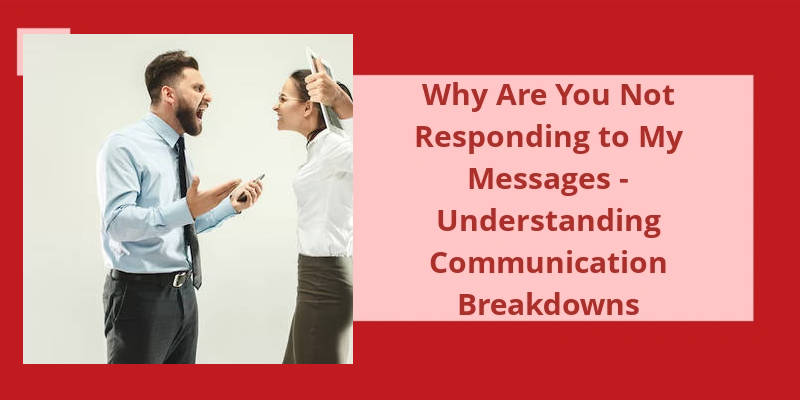Ghosting, the act of abruptly cutting off communication with someone without explanation or warning, has become an all-too-common occurrence in today's digital dating landscape. But just how long does it take for unanswered texts to cross the line from mere indifference to full-fledged ghosting? While there’s no definitive answer, opinions vary. Some argue that if you haven't received a response after three days, it's safe to assume you've been ghosted. However, there’s a growing consensus among a significant number of individuals who believe that waiting even 24 hours without any form of communication is enough to consider oneself ghosted. This blog aims to delve deeper into this perplexing phenomenon and explore the different perspectives on the timeline of ghosting.
What Counts as Ghosting Text?
Ghosting in the context of text messages refers to the act of deliberately ignoring or choosing not to respond to someones texts or emails indefinitely. It’s a form of communication avoidance that can leave the recipient feeling abandoned and confused. While theres no set number to determine when ghosting occurs, one of the most common examples is when someone leaves another persons text messages on “Read” for an extended period, without ever replying. This can be particularly hurtful since it implies that the senders messages aren’t even worth responding to.
This is especially harsh as it leaves the other person wondering what went wrong and feeling rejected without any explanation. Ghosting after a date is often considered one of the most painful forms of ghosting since it involves emotional investment and a sense of vulnerability.
This can happen over a prolonged period, and each unanswered text furthers the perception of ghosting. It’s important to note that the definition of ghosting may vary depending on the individuals involved.
In addition to the previously mentioned examples, ghosting can also occur when two individuals have been engaged in a continuous and meaningful conversation, and suddenly, one party stops responding. This longer conversation adds to the emotional investment and can leave the other person feeling bewildered and rejected. Ghosting can also manifest in situations where someone regularly contacts another person, but the recipient consistently fails to respond, showing a pattern of avoidance.
What one person may perceive as ghosting, another may view as a temporary disconnect or a need for personal space. Ultimately, open and honest communication is vital to prevent misunderstandings and ensure healthy relationships, both online and offline.
The Psychological Effects of Ghosting in Text Messages
Ghosting in text messages, which refers to abruptly cutting off communication with someone without explanation or warning, can have significant psychological effects. Being ghosted can leave the recipient feeling confused, hurt, and rejected.
When someone is ghosted, they may experience self-doubt and question their self-worth. They often feel anxious, wondering what went wrong or if they did something to cause the sudden silence.
The lack of closure from being ghosted can make it difficult to move on and can leave emotional scars. It can erode trust and make individuals hesitant to engage in future relationships or communication.
It’s important to recognize that ghosting someone can also have negative psychological effects on the person doing the ghosting. They may feel guilty, anxious, or uncomfortable about their actions, which can impact their own mental well-being.
Overall, ghosting in text messages can have a profound impact on both the recipient and the person initiating the ghosting, often leading to negative emotional consequences.
Communication in relationships can sometimes be unclear or inconsistent, leaving one wondering about the intentions of the other person. In the case of not receiving a text for two days, it may not immediately constitute ghosting. While two days might suggest a potential lapse in communication, it’s important to reserve judgment until further interactions occur. Only time will reveal whether this was a simple oversight or a more deliberate act of ghosting.
Is Not Texting for 2 Days Ghosting?
When it comes to gauging whether not texting for two days should be considered ghosting, it’s important to understand the underlying dynamics of ghosting itself. Ghosting is typically characterized by a sudden and complete disappearance of communication, leaving the recipient in a state of confusion and uncertainty. In this context, a mere two days of silence may not necessarily qualify as ghosting just yet.
It’s crucial to take into account that people have different daily routines and commitments that might temporarily hinder their ability to respond promptly. Two days may simply indicate a busy period or unexpected circumstances, rather than intentional ghosting. After all, forgetting to respond or getting caught up in daily obligations is a common occurrence and doesn’t always signify a complete abandonment of communication.
While it’s understandable to feel uneasy or anxious during a period of no response, it’s important to give the person the benefit of the doubt until more time passes. In some cases, they might reach out again, apologizing for their delayed response, or providing an explanation for their absence. Time will reveal whether the absence of communication was due to genuine reasons or a deliberate decision to cut off contact completely.
While it’s natural to feel concerned or uncertain when faced with sudden silence, it’s important to exercise patience and avoid jumping to conclusions prematurely. Remember, effective communication involves open dialogue and understanding, so allowing time and space for the other person to reestablish contact is crucial before labeling their behavior as ghosting. So, it’s best to remain patient and see how the situation unfolds.
The Long-Term Effects of Ghosting on Self-Esteem and Trust in Future Relationships
- Feelings of abandonment and rejection
- Decreased self-worth and self-confidence
- Insecurity in future relationships
- Lack of trust in others
- Fear of vulnerability and getting hurt
- Difficulty forming new connections
- Emotional and psychological distress
- Impact on mental health and well-being
- Questioning one’s own likability and desirability
- Deterioration of communication skills
In today’s interconnected world, the phenomenon of ghosting has expanded beyond the realm of dating and into various areas of our digital lives. While ghosting traditionally referred to the act of abruptly ending romantic relationships by ceasing all communication, it’s definition has evolved to include instances where individuals don’t respond or abruptly cut off social media contact without any explanation. Whether it’s through unanswered calls, texts, or online interactions, being repeatedly ignored can leave one feeling perplexed and wondering if they have, indeed, been ghosted.
Is Not Responding Considered Ghosting?
Isn’t responding considered ghosting? The phenomenon of ghosting has become increasingly prevalent in our digital age. Ghosting can take various forms, and one common manifestation of it’s when someone repeatedly attempts to contact another person but receives no response. This lack of communication is a strong indicator that the individual has been ghosted. It can be hurtful and confusing, leaving the person on the receiving end with unanswered questions and a sense of rejection.
Ghosting isn’t limited to traditional text messaging or phone calls. In fact, it’s extended into the realm of social media. The act of ghosting on social media involves cutting off all contact with someone online without any explanation. It could mean unfollowing, unfriending, or blocking the person on various social media platforms, effectively eliminating any means of communication. This can be even more devastating as it not only eliminates physical contact but also digital connection, leaving the person feeling completely shut out and rejected.
The concept of ghosting is often associated with dating or romantic relationships, but it can occur in any type of relationship. It can happen with friends, family members, co-workers, or anyone we’re in regular contact with. Ghosting can leave deep emotional scars, as it erodes trust and creates feelings of abandonment and self-doubt. It often leaves the ghosted person questioning their own worth, wondering what they did wrong to deserve such silent treatment.
Building Stronger Relationships to Prevent Ghosting: How Can Open Communication and Emotional Intelligence Help Prevent Ghosting in Different Types of Relationships?
Building stronger relationships is essential to prevent ghosting in various types of relationships. Open communication plays a crucial role in maintaining healthy connections and reducing the likelihood of being ghosted. By fostering a safe space for honest and transparent conversations, individuals can express their feelings, needs, and concerns, fostering a deeper understanding between both parties.
Additionally, emotional intelligence can play a significant role in preventing ghosting. This involves being mindful of one’s own emotions and empathetically understanding the emotions of others. By enhancing emotional intelligence, individuals can better navigate relationship challenges, handle conflicts effectively, and maintain stronger connections.
Whether in romantic relationships, friendships, or professional connections, it’s important to establish clear expectations and boundaries. Communicating one’s needs and desires openly while actively listening to the other person’s perspective can help address potential issues before they escalate, reducing the likelihood of ghosting.
Furthermore, building trust is paramount in preventing ghosting. Being reliable, consistent, and honoring commitments helps establish a sense of security and reliability in relationships. Regularly checking in and expressing genuine interest in the other person’s well-being can also contribute to deepening connections and preventing ghosting.
In summary, open communication, emotional intelligence, establishing clear expectations, and building trust are key strategies in preventing ghosting in all types of relationships. By prioritizing these aspects, individuals can foster stronger connections and decrease the likelihood of being ghosted.
Source: People need to understand that not responding to small …
But what about those times when the lines of communication are still open, yet the person in question consistently avoids your messages or gives brief, unenthusiastic responses? Is that ghosting too, or is there a different term for this kind of behavior? It’s important to delve into the nuances of ghosting and understand when it truly begins.
At What Point Does It Count as Ghosting?
At what point does it count as ghosting? In most situations, if you havent heard from someone even after contacting them repeatedly, theyve ghosted you. It’s a frustrating experience when someone suddenly disappears from your life without any explanation. They won’t respond to your messages or calls, leaving you wondering what went wrong. A telling sign that youve been ghosted is if you cant get in contact with them. It’s as if theyve vanished into thin air, leaving you questioning why and feeling hurt. No matter how you reach out or for how long, you don’t hear back.
Ghosting can be emotionally distressing, as it leaves you feeling rejected and confused. You may question if you did something wrong or if they simply lost interest. The lack of closure can be difficult to cope with, leading to feelings of self-doubt and insecurity. It’s important to remember that ghosting is a reflection of the other persons behavior, not your worth.
Experts say that ghosting typically occurs after a few unanswered messages. However, the exact number of unanswered texts that qualifies as ghosting may vary depending on the circumstances and the nature of the relationship. If someone consistently ignores your attempts to reach out over a significant period of time, it can be considered as ghosting.
If they’re consistently avoiding your messages and calls without any valid reason, it’s a clear indication that they’re intentionally avoiding you. It’s important to recognize when youve been ghosted and to prioritize your own emotional well-being by focusing on other aspects of your life that bring positivity and fulfillment.
It’s essential to prioritize your own emotional well-being and focus on other aspects of your life that bring you happiness and fulfillment.
Conclusion
Although various opinions exist on the matter, it seems that a growing consensus suggests that the timeframe for ghosting is shorter than what was previously believed. While some may argue that it takes around three days of silence to classify it as ghosting, an increasing number of individuals contend that anything beyond 24 hours is sufficient grounds for deeming oneself ghosted. The accelerated pace of today's interconnected world has seemingly redefined our expectations of timely responses, leading to an inevitable reassessment of what constitutes ghosting. Whether ultimately determined by personal experiences or societal norms, the definition of ghosting is fluid, leaving each individual to navigate the uncertainties of modern relationships in their own unique way.






